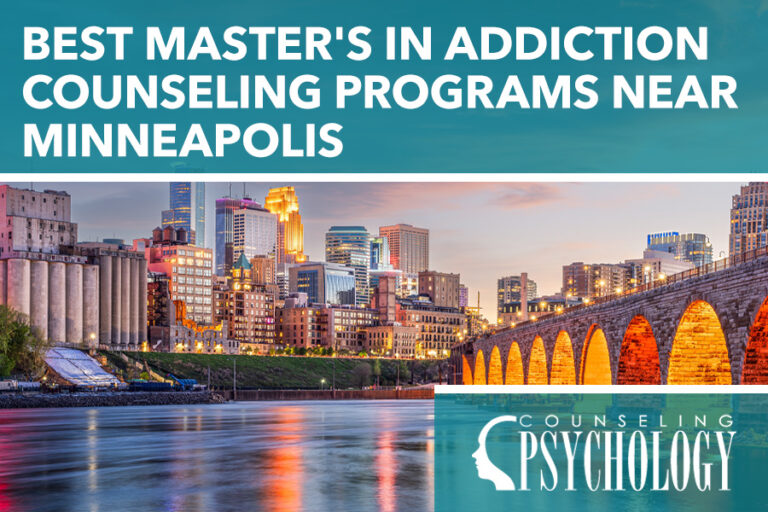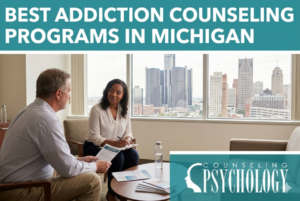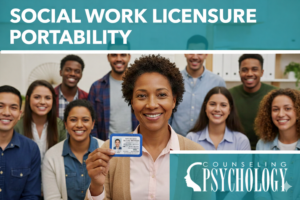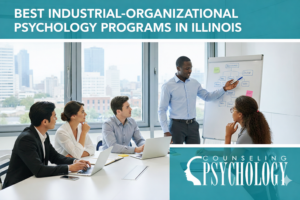Your Complete Guide to the Best Master’s in Addiction Counseling Programs Near Minneapolis

Addiction counseling is one of the most rewarding and fast-growing specialties in the behavioral health field. Minnesota, particularly the Minneapolis–Saint Paul region, has a long-standing reputation for leadership in substance use treatment, recovery innovation, and mental health care. From nationally known recovery institutions to community-based programs, the Twin Cities offer outstanding opportunities for graduate-level training and employment.
If you are considering earning a master's degree in addiction counseling, Minneapolis is an ideal place to begin. The region combines high-quality graduate programs with extensive clinical networks and a strong job market for licensed professionals.
In this article, you will learn:
- What makes a great master's program in addiction counseling
- Top clinical practicum sites and major Twin Cities employers
- The basics of Minnesota licensure for addiction professionals
- Online and hybrid options available to Minnesota students
- How to choose a program that fits your goals and lifestyle
2026 Best Master's in Addiction Counseling Near Minneapolis
Metropolitan State University
Saint Paul, MN - Public 4-Year - metrostate.edu
Master's - Co-occurring Disorders Recovery Counseling
Campus Based - Visit Website
Metropolitan State University's Co-occurring Disorders Recovery Counseling Master's program specializes in treating substance use and mental health issues together, preparing graduates for licensure as Alcohol and Drug Counselors and Professional Counselors in Minnesota. This 60-credit, NASAC-accredited curriculum emphasizes evidence-based clinical training, culturally responsive practices, and trauma-informed care, with full-time completion in three years and part-time options. Students develop advanced skills through practicum and research, focusing on person-centered approaches and multicultural competence. Admission requires a bachelor's degree with a minimum 3.0 GPA, preferably in health or social sciences, and no entrance exam is mentioned as required.
- 60-credit comprehensive graduate program
- NASAC accredited program
- Qualifies for Minnesota counselor licensure
- Evidence-based clinical training
- Culturally responsive curriculum
- Full-time students complete in 3 years
- Part-time option available
- Advanced clinical skills development
- Practicum and research experience included
University of Minnesota-Twin Cities
Minneapolis, MN - Public 4-Year - twin-cities.umn.edu
Master's - Master of Professional Studies in Addictions Counseling
Campus Based - Visit Website
The University of Minnesota-Twin Cities offers a Master of Professional Studies in Addictions Counseling that prepares professionals to address complex substance use disorders through evidence-based treatment modalities. This 30-credit campus program explores biological, social, and psychological addiction factors and can be completed in 1.75-3 years at $850 per credit. Admission requires a minimum 3.0 GPA, and notably, no GRE is required. Students complete 880 supervised internship hours and benefit from experienced faculty, with graduates entering a robust job market featuring 22.9% projected employment growth in Minnesota.
- 30 total credit program
- 3.0 GPA admission requirement
- $850 per credit tuition
- 1.75-3 years completion time
- No GRE required
- Two pathway options: traditional/accelerated
- Internship: 880 supervised hours
- Evidence-based counseling curriculum
- Experienced, diverse faculty
Why Minneapolis Is a Prime Location for Addiction Counseling Training
Minneapolis has deep roots in the recovery movement and remains one of the nation's most active centers for substance use treatment and behavioral health research. The area's large network of hospitals, rehabilitation centers, and nonprofit organizations creates an excellent environment for professional preparation.
Reasons the Twin Cities stand out:
- Home to nationally recognized treatment centers such as Hazelden Betty Ford Foundation and Fairview Recovery Services
- Strong partnerships between universities and community agencies that help students secure practicum placements
- Diverse client populations and treatment models, from inpatient detox to long-term residential recovery
- State and county initiatives that promote integrated behavioral health and expand access to care
Did you know?
Minnesota consistently ranks among the top states for addiction treatment access and quality, supported by both public funding and private-sector investment.
Learn more about counseling programs in Minnesota.
What to Look for in a Quality Master's in Addiction Counseling Program
When choosing a program in the Minneapolis area, focus on academic rigor, clinical preparation, and alignment with state licensure requirements.
| Feature | Why It Matters | Example in the Twin Cities |
| CACREP Accreditation | Ensures coursework meets national standards for LADC and LPC licensure | University of Minnesota, St. Mary's University of Minnesota |
| Clinical Placement Support | Guarantees access to practicum and internship opportunities | Augsburg University, Metro-area partner clinics |
| Flexible Formats | Hybrid or online programs for working professionals | St. Cloud State University, Adler Graduate School |
| Experienced Faculty | Instructors with counseling, psychology, and addiction practice backgrounds | Minneapolis-based universities with licensed clinicians on staff |
Accreditation through CACREP or a recognized regional agency is especially important for students planning to pursue the Licensed Alcohol and Drug Counselor (LADC) credential in Minnesota.
Clinical Training Opportunities Near Minneapolis
Hands-on experience is a cornerstone of every addiction counseling master's program. In the Twin Cities, students can complete clinical placements in a wide range of professional environments, from major hospital systems to nonprofit treatment centers.
| Site Name | Location | Focus Area |
| Hazelden Betty Ford Foundation | Center City and Plymouth | Inpatient and outpatient addiction recovery programs |
| NUWAY Alliance | Minneapolis | Residential and outpatient recovery programs for adults |
| Fairview Recovery Services | Minneapolis | Hospital-based substance use and mental health integration |
| Nystrom and Associates | Bloomington and multiple metro sites | Outpatient therapy and co-occurring disorders |
| Pride Institute | Eden Prairie | LGBTQ+ specialized substance use treatment |
| The Retreat | Wayzata | 12-step community recovery and spiritual care |
| Avivo | Minneapolis | Vocational and community-based substance use recovery |
| People Incorporated Mental Health Services | St. Paul | Integrated behavioral health and harm reduction |
These placements give students the opportunity to work with diverse populations and explore multiple counseling models, including harm reduction, abstinence-based recovery, and dual-diagnosis treatment.
Typical Admissions and Curriculum Overview
Admission requirements vary slightly by school, but most programs in the Twin Cities share a common set of expectations.
Typical admissions requirements:
- Bachelor's degree in psychology, counseling, social work, or a related field
- Minimum GPA around 3.0
- Letters of recommendation and personal statement
- Resume or curriculum vitae
- Interview or writing sample (depending on the program)
Sample Curriculum Overview
| Core Area | Example Courses |
| Addiction Theory and Counseling | Foundations of Substance Use Counseling, Addiction and Recovery Models |
| Counseling Techniques | Group Therapy, Motivational Interviewing |
| Pharmacology | Drugs, the Brain, and Behavior; Medication-Assisted Treatment |
| Co-Occurring Disorders | Integrated Treatment for Dual Diagnosis |
| Ethics and Professional Practice | Legal and Ethical Issues in Counseling, Minnesota Counseling Law |
| Field Experience | Supervised Practicum and Internship (600–1,000 hours) |
Most master's programs take between two and three years to complete, depending on enrollment status and internship scheduling.
Online and Hybrid Pathways for Minnesota Students
Online and hybrid options make it easier for working professionals or students outside the metro area to pursue addiction counseling training. Many Minnesota universities now offer fully online coursework paired with local clinical placements.
Examples include:
- St. Cloud State University: Online Master of Science in Clinical Mental Health Counseling with an addiction focus
- Adler Graduate School: Hybrid master's in counseling with an addiction specialization
- Capella University (headquartered in Minneapolis): Fully online master's in addiction studies aligned with LADC requirements
While coursework may be online, field experiences must be completed in person under the supervision of a licensed professional. Students in the Twin Cities typically complete practicum hours at partner agencies within commuting distance.
When evaluating online programs, confirm that they meet Minnesota's specific course and fieldwork standards for LADC or LPC licensure.
Minnesota Addiction Counseling Licensure Overview
Most graduates from Minneapolis-area addiction counseling programs pursue one of two credentials:
- Licensed Alcohol and Drug Counselor (LADC)
- Licensed Professional Counselor (LPC) or Licensed Professional Clinical Counselor (LPCC)
Both require a master's degree in counseling or a closely related field, supervised clinical experience, and successful completion of a national exam such as the IC&RC or NCE.
Licensure and certification are regulated by the Minnesota Board of Behavioral Health and Therapy. Graduates must also meet ongoing continuing education requirements to maintain their license.
Licensure Snapshot for Minnesota:
- Master's degree from an accredited institution
- 880 or more supervised clinical hours (depending on pathway)
- Passing score on national examination
- Application and background check with the state board
Career Outlook and Major Employers in the Twin Cities
The need for qualified addiction and substance abuse counselors continues to grow across Minnesota. According to regional workforce data, the Twin Cities have one of the highest concentrations of behavioral health jobs in the Midwest.
Common employers include:
- Hazelden Betty Ford Foundation
- Allina Health and M Health Fairview
- NUWAY Alliance
- Minnesota Department of Human Services – Behavioral Health Division
- Nystrom and Associates
- Avivo
- People Incorporated Mental Health Services
- Fairview Recovery Services
Sample Career Roles & Salary Ranges
| Role | Typical Employer | Approximate Salary Range (Minneapolis Area)* |
| Licensed Alcohol and Drug Counselor (LADC) | NUWAY, Fairview | $55,000–$70,000 |
| Dual-Diagnosis Counselor | Allina Health, Nystrom | $60,000–$80,000 |
| Clinical Supervisor | Hazelden Betty Ford, Avivo | $80,000–$95,000 |
| Program Director | Nonprofits or hospital networks | $75,000–$90,000 |
| Community Outreach Specialist | County or nonprofit agencies | $50,000–$65,000 |
Estimates based on Bureau of Labor Statistics and local job postings for 2025.
Tips for Choosing the Right Addiction Counseling Program in the Twin Cities
- Verify that your program is CACREP-accredited and meets Minnesota LADC or LPC licensure standards.
- Ask about local practicum placement support to ensure sites are accessible within the metro area.
- Compare full-time versus part-time scheduling if you plan to continue working.
- Look into scholarships, employer tuition reimbursement, or loan forgiveness through behavioral health programs.
- Inquire about alumni employment outcomes and licensure exam pass rates.
For students pursuing a master's in addiction counseling, Minneapolis provides an exceptional balance of educational quality, hands-on clinical opportunities, and job prospects. The city's established recovery network, commitment to integrated behavioral health, and variety of accredited degree options make it one of the best places in the country to start a counseling career focused on substance use and recovery.
Whether you study on campus or through an online pathway, your training in the Twin Cities will prepare you to help individuals, families, and communities heal from addiction and lead healthier lives.
Frequently Asked Questions (FAQs)
Q: Can I complete a master's in addiction counseling fully online in Minnesota?
A: Yes, several universities offer online or hybrid programs, but clinical internships must still be completed in person at approved sites.
Q: How long does it take to finish a master's in addiction counseling?
A: Most programs take between two and three years, depending on course load and practicum scheduling.
Q: What is the difference between LADC and LPC licensure in Minnesota?
A: The LADC focuses on substance use treatment, while the LPC or LPCC covers a broader scope of counseling including mental health and co-occurring disorders.
Q: Are there paid internships or practicum placements in Minneapolis?
A: Some hospitals and nonprofits provide stipends or tuition assistance for graduate interns. Ask programs about existing partnership agreements.
Q: Where are addiction counselors most needed in the Twin Cities?
A: High-demand areas include hospital-based recovery units, residential treatment centers, and outpatient co-occurring disorder programs across Hennepin and Ramsey counties.



